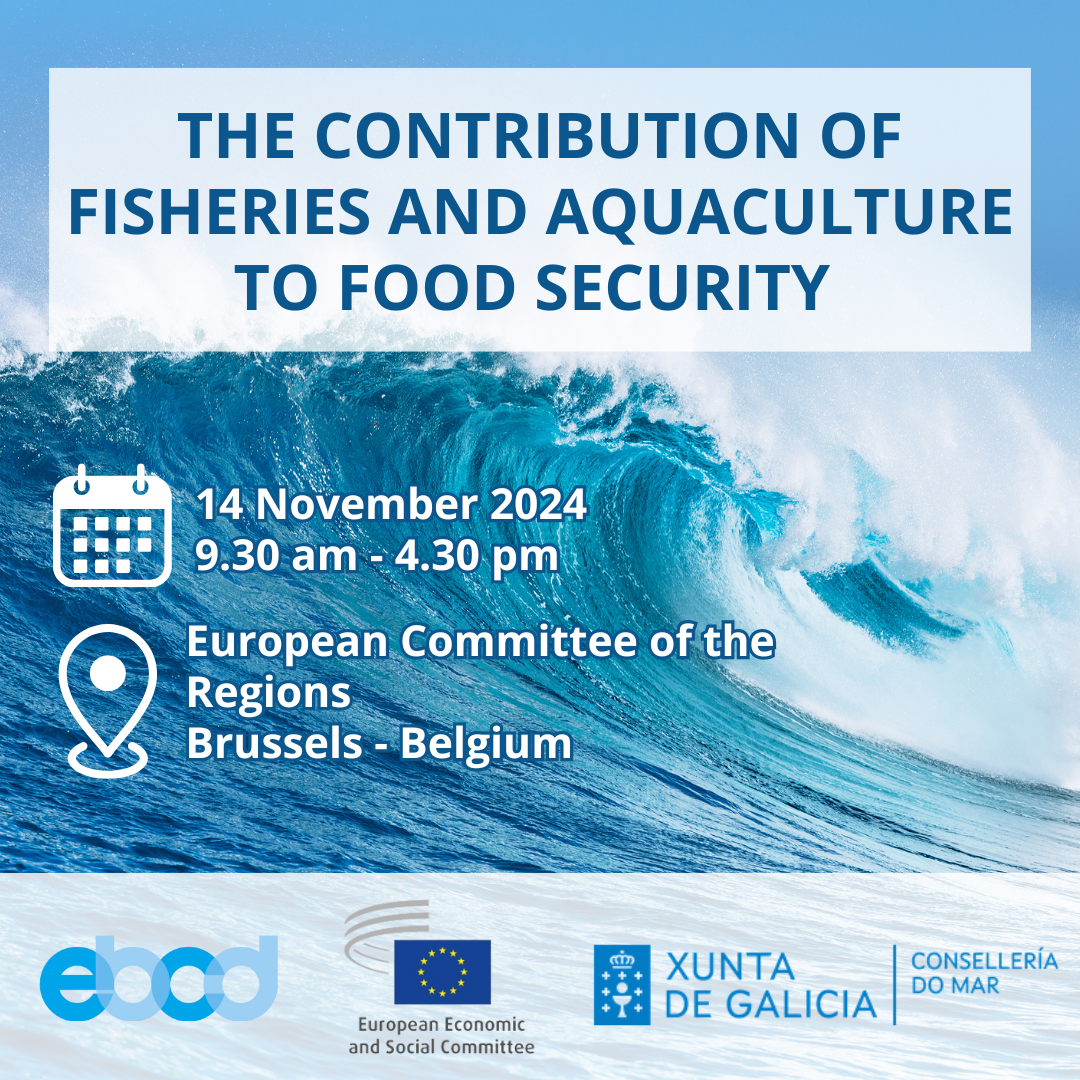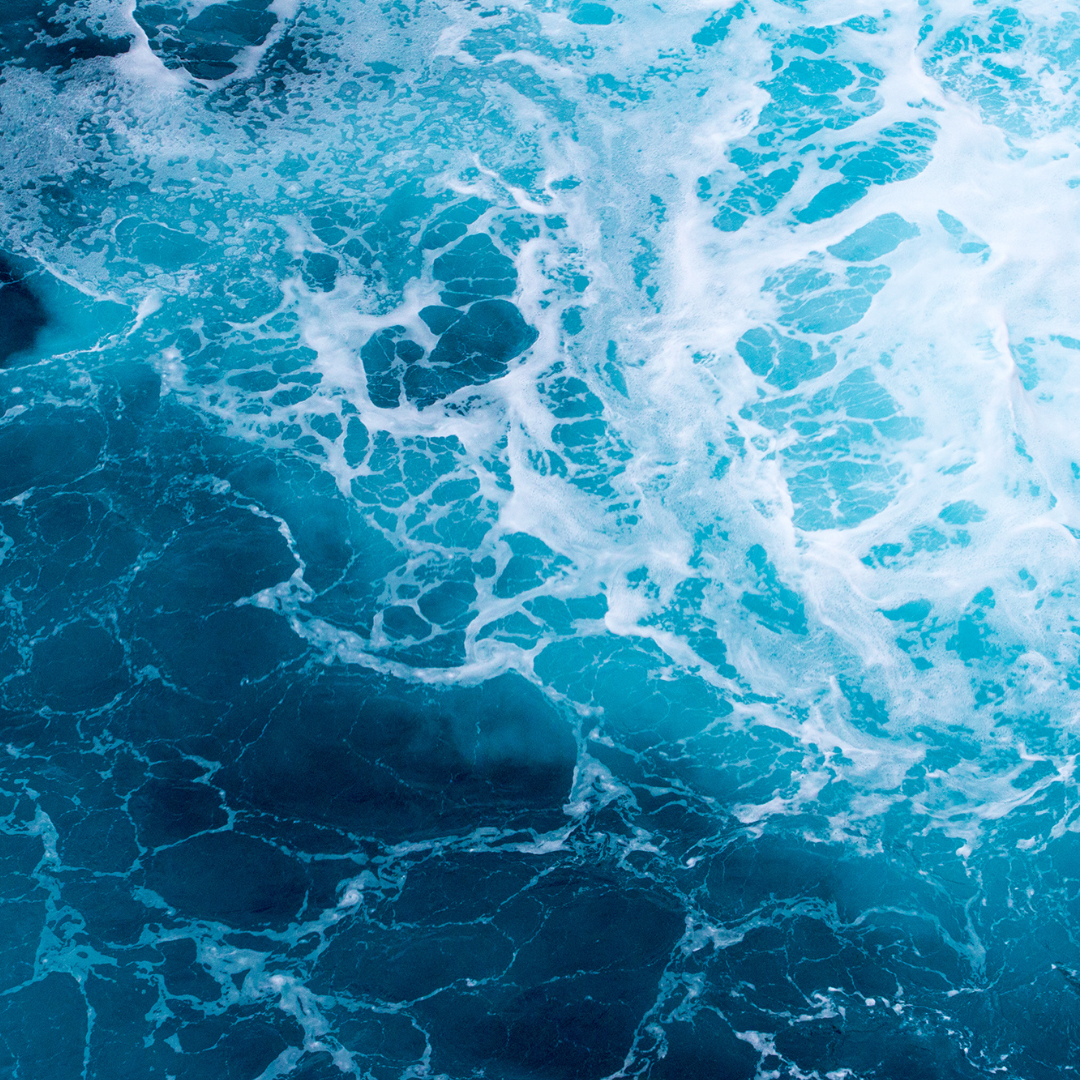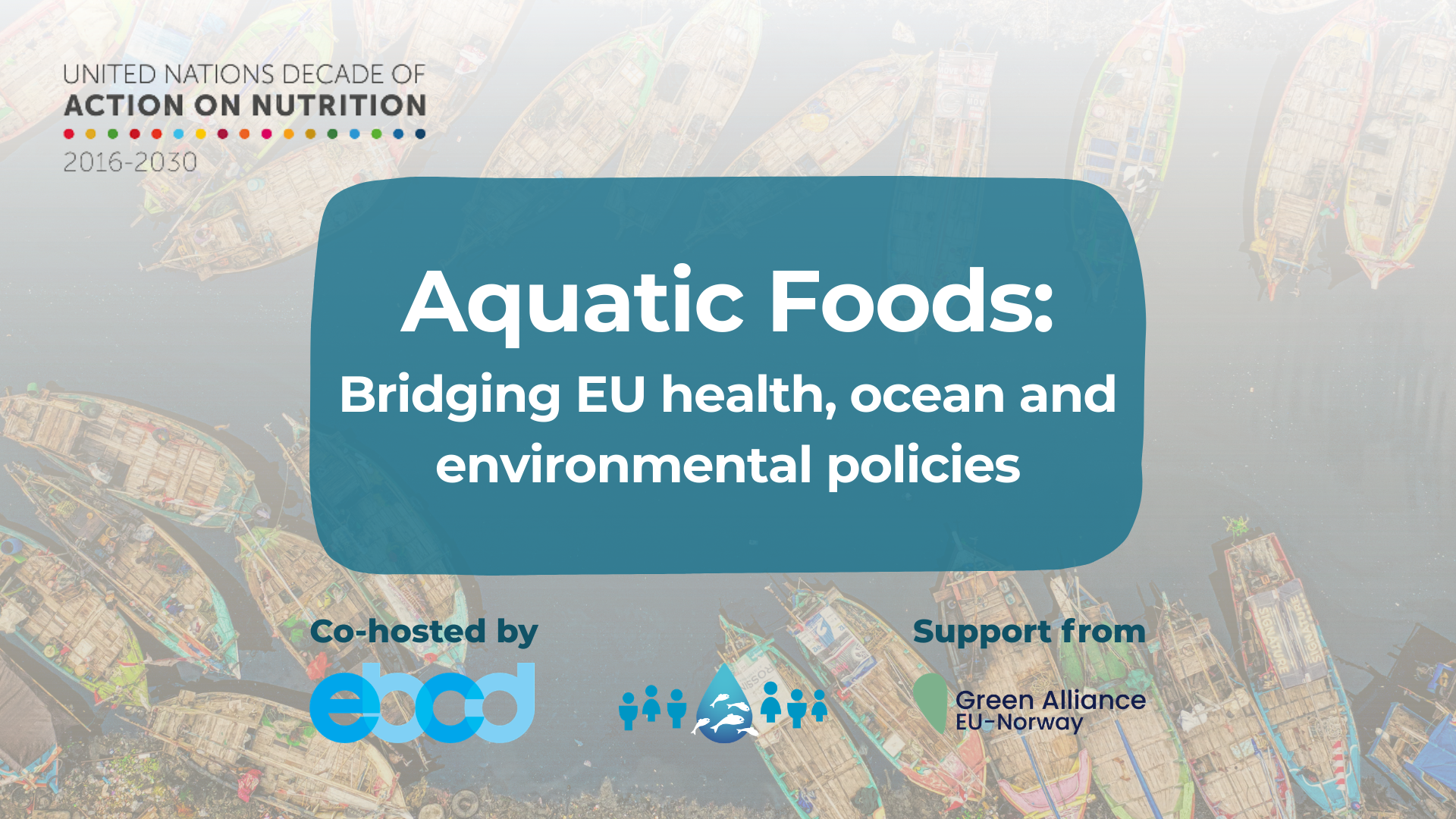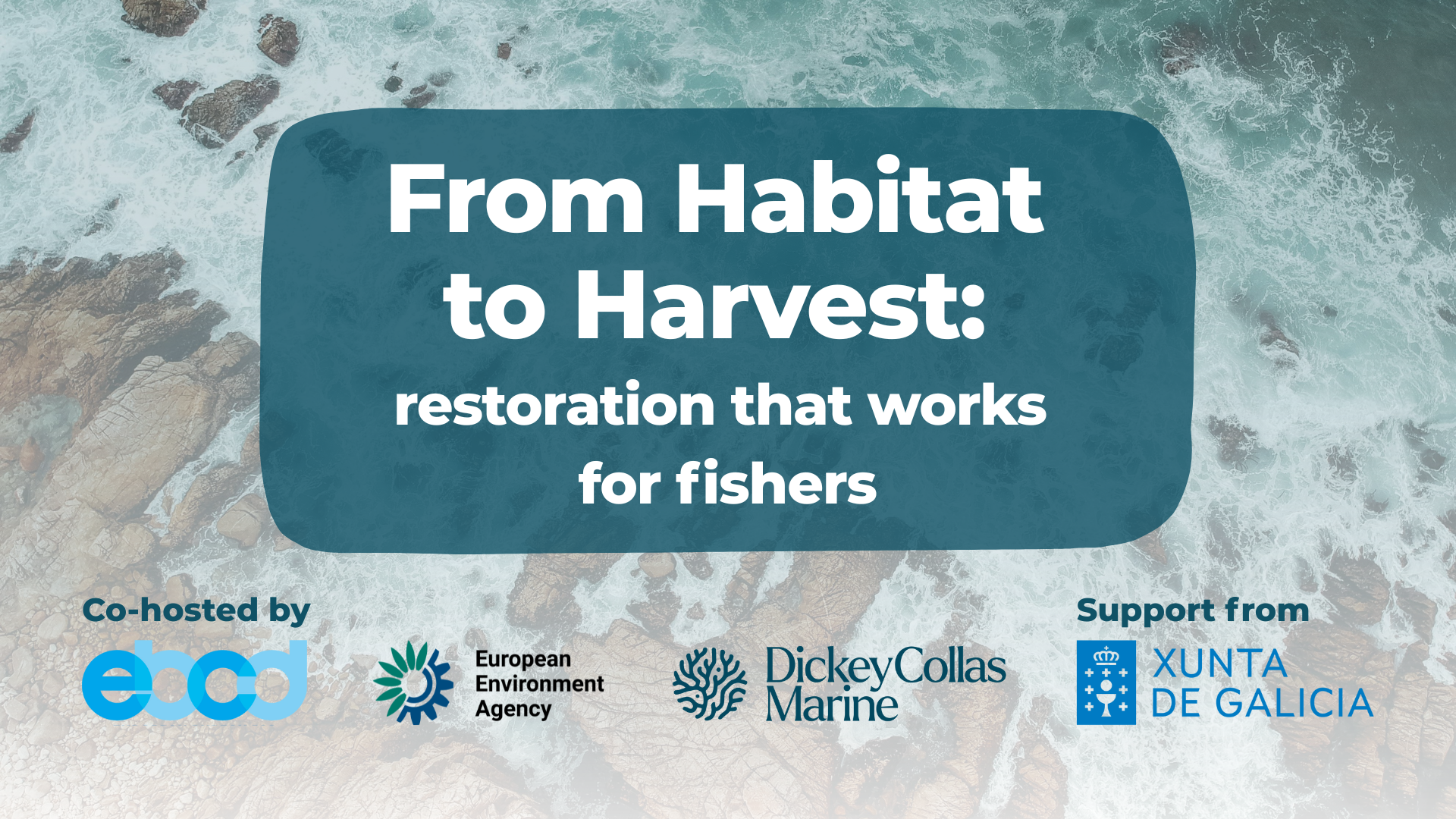When: 14 November 2024, 9.30- 16.30 CET
Where: European Committee of the Regions – Rue Van Maerlant 2 – 2nd floor – VMA21 – 1000 Brussels, Belgium
This event is organised by EBCD in partnership with the European Economic and Social Committee (EESC) and sponsored by the Xunta de Galicia.
The EU is an important food exporter to the world. We know that aquatic foods are healthy foods, whether for human health or environmental impact. Hunger and malnutrition across the globe are far from being resolved and, there are growing risks that are dramatically aggravating food security worldwide. Pandemics, wars, climate change and biodiversity loss illustrate the vulnerability of our food systems to external factors. The need for resilient and sustainable food systems is essential to ensure food security and is becoming even more relevant with a population expecting to increase by nearly 2 billion people in the next 30 years (UN). At the same time, the climate-food systems nexus has become part of the discussions in the global processes. At the UNFCCC COP 28, more than 150 countries signed a declaration on Sustainable agriculture, resilient food systems and climate action thereby strongly linking the issue of climate change and food systems. In this context, aquatic foods play a considerable role, as they contribute to many UN Sustainable Development Goals (SDGs). Indeed, aquatic foods are an important source of long chain fatty acids, high quality proteins, and essential micronutrients important to human health; while the world will need 50% more food by 2030 due to a rising population (FAO), aquatic foods constitute essential components of a healthy diet. All in all, as aquatic products have a lower carbon footprint than any other animal production industry, fisheries and aquaculture sectors represent real assets to tackle the climate and biodiversity crisis as well as to provide healthy food and livelihoods to a growing worldwide population.

This conference will demonstrate how aquatic foods contribute to achieving our climate objectives and ensure food security while, making food systems more sustainable and resilient. It will help us understand the key challenges and obstacles for aquatic foods such as space-squeeze, energy transition, etc, as well as how to increase the consumption of a variety of sustainable produced aquatic foods as part of a healthy diet. It will enable knowledge-holders to interact, as well as to bring about key transformative recommendations to further build sustainable and resilient food systems. Therefore, scientists, academia, policymakers actors in the entire aquatic food system value chain, civil society and representatives of international organisations will be encouraged to participate.
DRAFT AGENDA
Moderator: Dr. Mark Dickey-Collas (DickeyCollas Marine)
9.00-9.30 Welcome coffee
9.30 – 10.45 Keynote speeches:
- Welcome and introductory remarks by Piroska Kallay – Member of the European Economic and Social Committee EESC Member
- EBCD – Despina Symons – Director at EBCD
- European Parliament
- Francisco Millan Mon – Member of the Committee on Fisheries of the European Parliament
- André Rodrigues – Member of the Committee on Fisheries of the European Parliament
- FAO – Dr. Manuel Barange – Assistant Director General, Director of the Fisheries and Aquaculture Division at FAO => presentation
- European Commission – Delilah Al Khudairy – Director of Maritime Policy & Blue Economy at DG MARE
- European Council Presidency – Marta Janakakisz – Fisheries Advisor of the Hungarian Permanent Representation => presentation
10.45 – 11.00 Coffee Break
11.00 – 13.00 1st panel on ‘Efforts towards healthy and sustainable diets’:
- Aquatic foods’ contribution to Sustainable Food Systems – Ambassador Jón Erlingur Jónasson, Chair of the UN Aquatic Blue Foods Coalition)
- Benefits of aquatic foods for human nutrition and health – Livar Frøyland – Head of Research at the Norwegian Institute for Marine Research
- Challenges and opportunities for the fisheries sector – Daniel Voces de Onaindi, Managing Director at Europêche => presentation
- Progress towards achieving sustainable fisheries in the EU – Esben Sverdrup-Jensen Chair of the European Association of Fish Producers Organizations
- Challenges and opportunities for the aquaculture sector – Szilvia Mihalffy, Project Manager at the Federation of European Aquaculture Producers => presentation
Q&A session
13.00 – 14.00 Lunch Break
14.00 – 15.00 2nd panel on ‘Considering the social-ecological system of aquatic foods’:
- Outcomes of the Blue Food Assessment – University of Stockholm – Beatrice Crona
- What makes resilient and sustainable aquatic food production? – Jorn Schmidt – Director for Sustainable Aquatic Food Systems at WorldFish)
- Social-ecological Systems and Ecosystem-based Marine Management – Debbi Pedreschi – Irish Marine Institute => presentation
- Mission Ocean and Food 2030 – Nikos Zampoukas – Policy Officer at DG Research & Innovation => presentation
Q&A session
15.00-15.15 Coffee Break
15.15 – 16.15 3rd panel on ‘Challenges & high-level trade-offs’:
- Climate neutral and nature positive food systems – Laure Guillevic, Ocean Policy Officer, WWF EPO => presentation
- Climate change mitigation and adaptation: Carbon footprint and decarbonisation – Antonio Basanta – General Director of Fisheries, Aquaculture and Technological Innovation
- Conservation/restoration & sustainable management: Nature Restoration Law, 30 by 30 target and sustainable fisheries – Dr. Mark Dickey-Collas – DickeyCollas Marine
- Energy security & food security: spatial squeeze and maritime spatial planning – Felix Leinemann, Head of Unit of Blue Economy Sectors, Aquaculture and Maritime Spatial Planning at DG MARE
Q&A session
16.15-16.30 Closing remarks
17.00 Reception




